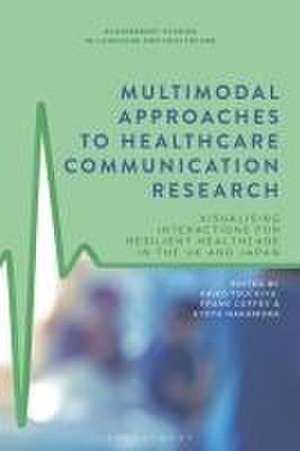Multimodal Approaches to Healthcare Communication Research: Visualising Interactions for Resilient Healthcare in the UK and Japan: Bloomsbury Studies in Language and Healthcare
Editat de Dr Keiko Tsuchiya, Professor Frank Coffey, Professor Kyota Nakamuraen Limba Engleză Paperback – 18 sep 2024
| Toate formatele și edițiile | Preț | Express |
|---|---|---|
| Paperback (1) | 191.22 lei 3-5 săpt. | |
| Bloomsbury Publishing – 18 sep 2024 | 191.22 lei 3-5 săpt. | |
| Hardback (1) | 568.87 lei 6-8 săpt. | |
| Bloomsbury Publishing – 22 mar 2023 | 568.87 lei 6-8 săpt. |
Preț: 191.22 lei
Preț vechi: 249.30 lei
-23% Nou
Puncte Express: 287
Preț estimativ în valută:
36.59€ • 37.80$ • 30.46£
36.59€ • 37.80$ • 30.46£
Carte disponibilă
Livrare economică 04-18 martie
Preluare comenzi: 021 569.72.76
Specificații
ISBN-13: 9781350298514
ISBN-10: 1350298514
Pagini: 230
Ilustrații: 51 bw illus.
Dimensiuni: 156 x 234 x 25 mm
Greutate: 0.33 kg
Editura: Bloomsbury Publishing
Colecția Bloomsbury Academic
Seria Bloomsbury Studies in Language and Healthcare
Locul publicării:London, United Kingdom
ISBN-10: 1350298514
Pagini: 230
Ilustrații: 51 bw illus.
Dimensiuni: 156 x 234 x 25 mm
Greutate: 0.33 kg
Editura: Bloomsbury Publishing
Colecția Bloomsbury Academic
Seria Bloomsbury Studies in Language and Healthcare
Locul publicării:London, United Kingdom
Caracteristici
Contains the work of scholars from across three disciplines: quality and safety in healthcare, multimodality in (applied) linguistics, and innovative information engineering
Notă biografică
Keiko Tsuchiya is Associate Professor at the Graduate School of Urban Social and Cultural Studies, Yokohama City University, Japan.Frank Coffey is Honorary Professor at Nottingham Trent University and Director of DREEAM (Department of Research and Education in Emergency Medicine Acute Medicine and Major Trauma) at Nottingham University Hospitals' NHS Trust, UK.Kyota Nakamura is Professor at the Department of Quality and Safety in Healthcare, Yokohama City University Medical Centre, and at the Department of Clinical Quality Management, Osaka University Hospital, Japan.
Cuprins
Foreword, Kazue Nakajima (Osaka University Hospital, Japan)Introduction, Keiko Tsuchiya (Yokohama City University, Japan)Part I: Multimodal Practice for Resilient HealthcareCase Studies in Japan1. Resilient Performance of a Medical Team in the Critical Care Setting, Kyota Nakamura (Osaka University Hospital, Japan)2. Novel Approaches to Identify Preventive Factors Against Falls Among Hospital Inpatients, Takeru Abe (Yokohama City University Medical Centre, Japan) and Kyota Nakamura (Osaka University Hospital, Japan)3. Creating Interactional Spaces for Making Requests, Kyota Nakamura (Osaka University Hospital, Japan), Takuma Sakai (Matsuoka Emergency Medical Service, Japan), and Keiko Tsuchiya, (Yokohama City University, Japan)Case Studies in the UK4. A Multimodal Linguistic Analysis of Gaze and Active-Listenership in Emergency Department Team Interactions, Sarah Atkins (Aston University, UK) and Malgorzata Chalupnik (University of Nottingham, UK)5. Projectability and Coordinated Actions in Emergency Care, Keiko Tsuchiya (Yokohama City University, Japan), Frank Coffey (Nottingham University Hospital NHS Trust, UK), and Alison Whitfield (Nottingham University Hospital NHS Trust, UK)Part II: Different Approaches to Healthcare Communication and Culture 6. Understanding the Impact of Restricted Interests on the Social Interactions of Adults with Autism Spectrum Disorder, Kyoko Aizaki (Lancaster University, UK), Chris Walton (Lancaster University, UK), and Charlie Lewis (Lancaster University, UK)7. Beyond Lingua-cultural Barriers: Co-construction of Professional Competence by Japanese and International Care Workers, Junko Mori (University of Wisconsin-Madison, USA) and Chiharu Shima, (Akita International University, Japan)8. Silent Replies as Indicators of Shared Common Ground between a Leader and Members in an Emergency Care Team, Akira Taneichi (Yokohama City University, Japan)9. Different Frames in Emergency Care Interactions between the UK and Japan, Keiko Tsuchiya (Yokohama City University, Japan), Akira Taneichi (Yokohama City University, Japan), Frank Coffey (Nottingham University Hospital NHS Trust, UK), and Kyota Nakamura (Osaka University Hospital, Japan)Part III: Visual and Virtual Technologies for Healthcare Simulation10. The Creation and Validation of a 360-degree Video-Based Situation Awareness Training and Assessment Tool for Trauma Team Leaders, Andrew Mackenzie (Nottingham Trent University, UK), Mike Vernon (Nottingham Trent University, UK), James A. C. Myers (Nottingham Trent University, UK), and Rob Hutton (Nottingham Trent University, UK)11. Using Immersive Virtual Environment for Educational Purposes, Miharu Fuyuno (Kyushu University, Japan)12. Capturing a Trauma Leader's Eye Gaze: a Semi-automatic Gaze-recognition Program, Takeshi Saitoh (Kyushu Institute of Technology, Japan), Keiko Tsuchiya (Yokohama City University, Japan)Conclusion, Keiko Tsuchiya (Yokohama City University, Japan), Frank Coffey (Nottingham University Hospital NHS Trust, UK), and Kyota Nakamura (Osaka University Hospital, Japan)ReferencesIndex
Recenzii
In this carefully crafted volume, the editors bring together contributions from several disciplines that converge on the study of interactions between healthcare professionals in emergency and critical care contexts. The emphasis on the visualization of these interactive practices is a significant achievement of the work as is the inclusion of studies in Japan and the UK. This is essential reading for clinicians and health communication scholars globally.
This edited volume examines in fine, visualized detail multidisciplinary healthcare teams by embracing a technology-assisted multimodal perspective across two cultural settings. Very befittingly, the authorship represents a diverse range of disciplinary backgrounds. In approaching healthcare systems as an ecological entity, the volume opens up a timely prospect for engaging with healthcare practice in complex environments - both theoretically and methodologically - and will serve as a useful analytical resource with its transparent writing style, graphics and terminological clarity.
This edited volume examines in fine, visualized detail multidisciplinary healthcare teams by embracing a technology-assisted multimodal perspective across two cultural settings. Very befittingly, the authorship represents a diverse range of disciplinary backgrounds. In approaching healthcare systems as an ecological entity, the volume opens up a timely prospect for engaging with healthcare practice in complex environments - both theoretically and methodologically - and will serve as a useful analytical resource with its transparent writing style, graphics and terminological clarity.
